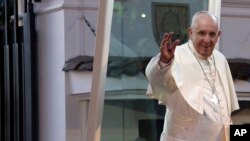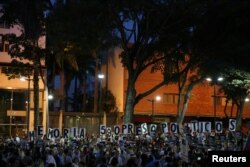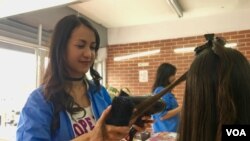Pope Francis opens the first full day in his Colombia visit Thursday with messages to political leaders and citizens alike encouraging all to rally behind a peace process seeking an end to Latin America’s longest-running conflict and to address the inequalities that fueled it.
Francis will kick off the day with a meeting with President Juan Manuel Santos at the presidential palace, where he is likely to call for building bridges among elites bitterly divided by last year’s peace deal with the Revolutionary Armed Forces of Colombia, or FARC.
It will be followed in the afternoon by an outdoor Mass in Simon Bolivar Park that is expected to be attended by hundreds of thousands of worshipers in one of Latin America’s most-fervently Roman Catholic nations.
In between, he is to meet with bishops from around the region, including his first encounter with clergy from neighboring Venezuela, who are looking for the pope to demand accountability from their country’s socialist government and deliver a message of hope to a nation torn by political and economic turmoil.
As his flight took off from Rome early Wednesday, the pontiff spoke briefly with journalists on board, emphasizing his goal to help Colombia advance on "the path of peace," the Catholic News Agency reported. He then noted the flight path over Venezuela, urging the journalists to pray for stability in that country — and for productive dialogue to achieve it.
Ysbeicy Salcedo, a Venezuelan hairstylist who came to Bogota in June, is pessimistic about the Roman Catholic Church’s ability to improve conditions in her homeland. It’s mired in a political and economic crisis that has been years in the making.
"They say that it has influence, but things follow the same," Salcedo said of the church. She added that the United States and the church, both of which she described as “empires,” “have not had weight” in resolving tensions.
Massive, anti-government street demonstrations that began in April have left more than 120 dead, though the protests have dwindled.
The Vatican has pressed for Venezuela’s socialist government to hold free elections, and it repeatedly has offered to mediate talks among the government’s supporters and opponents. The pope himself received Venezuelan President Nicolas Maduro in a private audience at the Holy See last October. But the Vatican last month condemned the new, pro-Maduro constituent assembly as a threat to human rights.
Francis is the third pope to visit Colombia, but the first Latin American pontiff — born Jorge Mario Bergoglio in Argentina — from a region with the largest concentration of the globe’s 1.1 billion Catholics.
Nearly four out of 10 Catholics lived in Latin America and the Caribbean as of 2010, the Pew Research Center’s latest data show. Colombia alone had the sixth-largest concentration of Catholics globally. Out of the country’s almost 49 million people, nearly seven out of 10 identify as Catholic.
"They are quite the believers here," Salcedo said.
The young woman, who’s been studying public relations, grew up in a Catholic family and attended Catholic school, but she doesn’t identify as Catholic.
Salcedo is part of a tide of Venezuelans that has swept into Colombia as conditions at home deteriorated. A native of Los Teques, in the coastal state of Miranda, she was able to obtain permanent residency, a legal status Colombia offered to Venezuelans who arrived before July 29.
Officials with Migration Colombia, a government agency, report that 153,000 Venezuelans have residency in the country, and that 1.5 million have entered as tourists in the last year.
Although Salcedo is thankful for Colombia's hospitality, she would return to her own country if conditions there improved, she said. "We want things to get better."
Bogota has prepared for the pontiff’s visit with tightened security, traffic restrictions and school closings.
The Associated Press contributed to this report.














